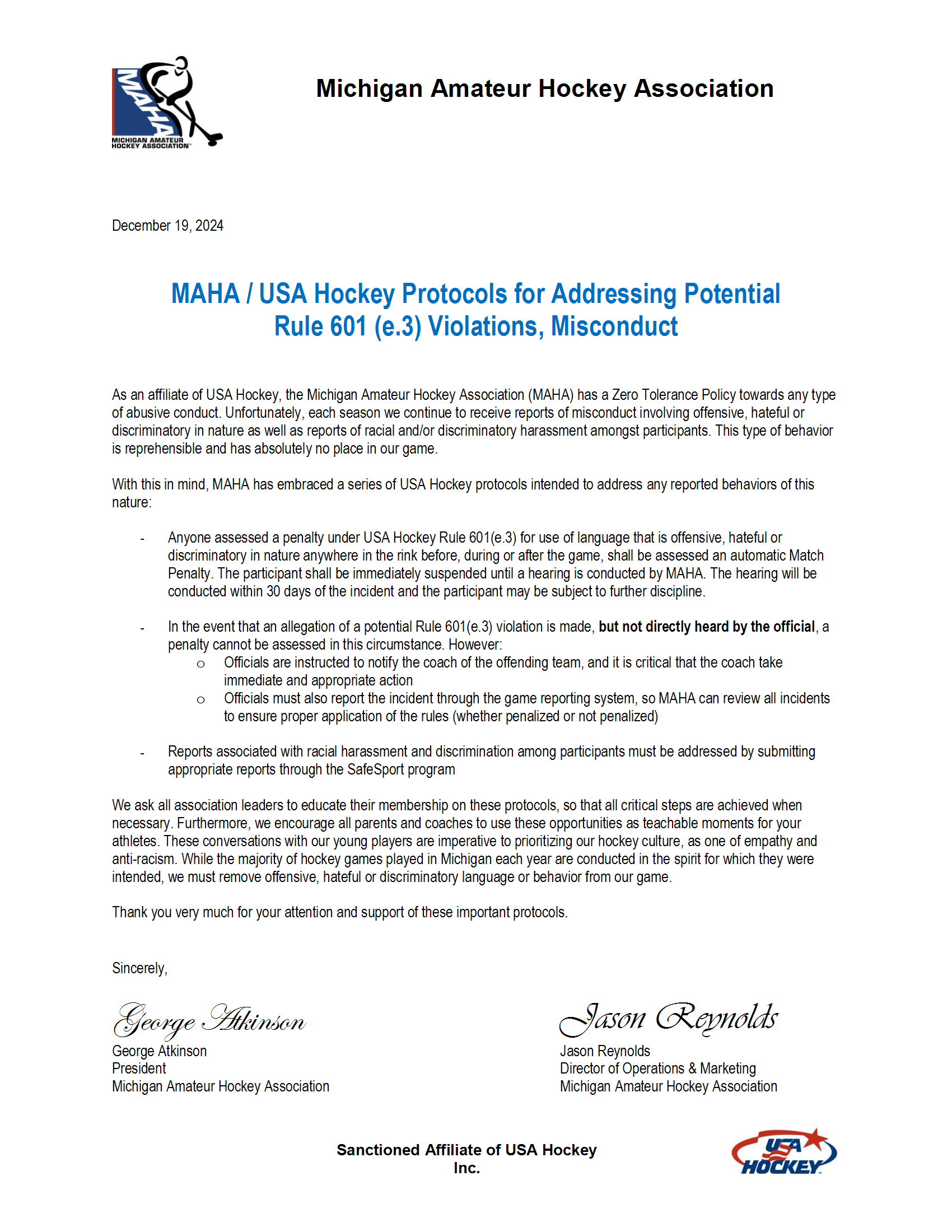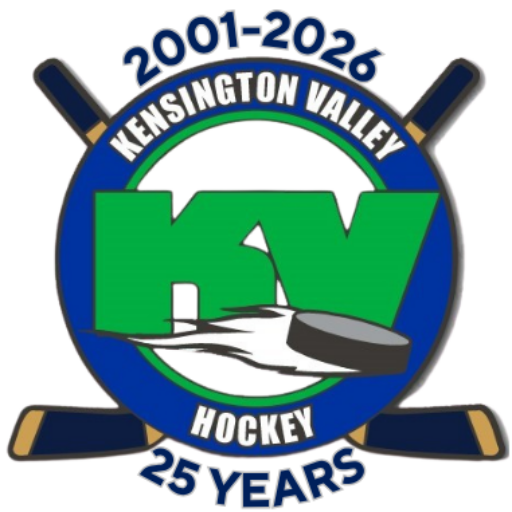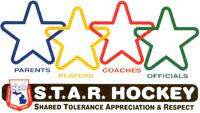USA Hockey SafeSport is a system in place to protect participants from physical abuse, sexual abuse and other types of abuse and misconduct that can be harmful to youth hockey players and other participants. These include without limitation Physical Abuse, Sexual Abuse, Screening, Locker Room Supervision and Hazing Policies, in addition to Codes of Conduct applicable to administrators, coaches, officials, parents, players and spectators.
Please review the Safesport materials. Parents are encouraged to watch the training module.
Should an incident occur, you can submit an incident report by clicking the link provided. SAFESPORT WILL TAKE ANONYMOUS REPORTS
No Tolerance Policy and SafeSport Reporting
All coaches, team managers and administrators are required to complete SafeSport training as a condition of their participation in USA Hockey programs. Players who are turning 18 year of age are also required to complete this. Parents are strongly encouraged to complete the training online at www.usahockey.com/safesporttraining.
KVHA has a no tolerance policy for physical, sexual, and emotional abuse, bullying, threats, harassment, and hazing. Participants, employees, or volunteers may be subject to disciplinary action for violation of these policies, for failure to report a known incident, or for engaging in any misconduct or abuse that violates the USA Hockey SafeSport Policies.
The USA Hockey reporting policy requires that every employee or volunteer of any USA Hockey member program must report
(1) actual or perceived violations of the USA Hockey SafeSport Program Handbook,
(2) any violations of the sexual abuse, physical abuse, emotional abuse, bullying, threats or harassment, or hazing policies, and
(3) suspicions or allegations of child physical or sexual abuse to the appropriate USA Hockey representatives; additionally, in all cases involving suspicions or allegations of child physical or sexual abuse, every employee or volunteer of USA Hockey member programs must also report to the appropriate law enforcement authorities.
If USA Hockey receives a report of physical or sexual misconduct involving a minor, USA Hockey will make a report to the proper authorities.
USA Hockey’s Reporting Policy provides for:
- Confidentiality for the victim, complainant, and accused perpetrator (all to the extent permitted by law)
- The ability to file reports anonymously.
- “Whistleblower” protection for persons that make reports in good faith
- Potential disciplinary action for making reports in bad faith
Reports of any actual or suspected violations should be reported to USA Hockey via online submission at usahockey.com/safesport, via email to SafeSport@usahockey.org, or by calling 1-800-888-4656.
Responding to Abuse & Other Misconduct
USA Hockey and its member programs respond to allegations of abuse or misconduct according to the provisions of USA Hockey Bylaw 10, which provides for a disciplinary process that must be followed in connection with suspension or other discipline of an individual, team or organization or others within the authority of USA Hockey. By following the process, USA Hockey provides a fair and reasonable process for handling reports of abuse or misconduct by members.
Upon a report or other notice of credible information or allegations, USA Hockey, its affiliates, or local programs will investigate and/or disciplinary proceedings to determine the appropriate discipline that may be imposed. USA Hockey and KVHA shall not conduct any investigation of, or hearing procedure, in response to allegations of child physical or sexual abuse if it in any way interferes with a pending legal investigation or criminal prosecution.
In some cases, disciplinary action may include a “summary suspension” in which the accused person is suspended prior to and pending a hearing. Summary suspension is intended for those situations in which an individual’s continued employment, membership or participation poses a risk of ongoing physical or emotional harm. In other cases, it is most appropriate for the USA Hockey program to provide notice to the accused followed by a hearing to assess whether discipline should be imposed. In all cases, disciplinary procedures and actions must be proportionate, reasonable, and applied fairly and equally.
Cell Phones and Other Mobile Recording Devices are Prohibited in the locker room!
Cell Phones and other mobile devices with recording capabilities, including voice recording, still cameras and video cameras, are not permitted in the locker rooms. Team Coaches and Managers are permitted to collect player phones. If phones or other mobile devices must be used, they should be taken outside of the locker room.
General Locker Room Rules
There can be no more than 4 years of age between players who are sharing a locker room.
Music is allowed in the locker room, but all songs must be the clean version with no obscenities or racial slurs. If a cell phone is being used to play music, it must not be used otherwise.
Players should not bring valuables to the rink. The locker room bathroom door and entry doors should both be locked when the players and coaches are on the ice to ensure that belongings are secure.
Locker Room Monitoring
KVHA has predictable and limited use of locker rooms and changing areas (e.g., 30 minutes before and following practices and games). After getting the key for the locker room, a coach, manager or locker room monitor should conduct a sweep of the locker room or changing area before players enter. If the coaches or monitors are not remaining inside the locker room(s), either a coach or approved team personnel (all of which have been screened) will be posted directly outside of the room during periods of use, and leave the doors open only when adequate privacy is still possible, so that only participants (coaches and players), approved team personnel and family members (where allowed - team rules) are permitted in the locker room. Team personnel will also secure the locker room appropriately during times when the team is on the ice.
It is the policy of KVHA, MAHA and USA Hockey that teams have at least two (2) responsible adults monitoring the locker room during all team events to assure that only participants and screened team personnel or family members are permitted in the locker room, and to supervise locker room conduct. These individuals will be SafeSport certified and background screened to serve in this capacity, in addition to the rostered coaches and managers who are certified and screened as well. Please note that with Co-ed programs, it is important that the person(s) monitoring the locker room is of the same gender as the players being monitored.
It is acceptable to have one (1) locker room monitor immediately outside the locker room and regularly checking in on the locker room if only one is available. If there are two (2) or more monitors, not from the same family, they can monitor from inside the locker room. Having only one person inside a locker room can expose that person to allegations, so a second person can help protect one another from allegations or provide accounts on any reported incidents. Having two member of the same family monitoring the locker room could set up a power dynamic and is not allowed either.
Parents in Locker Rooms
Except for players in the eight and under (8U) age groups, we discourage parents from entering locker rooms unless it is absolutely necessary. If a player needs assistance with equipment, if the player may be injured, or a player’s disability warrants assistance, then we ask that parents let the coach know beforehand that he or she will be helping the player. Naturally, with our youngest age groups it is necessary for parents to assist the players in getting dressed. We encourage parents to teach their players as young as possible how to get dressed so that players will learn as early as possible how to get dressed independently. In circumstances where parents are allowed in the locker room, coaches are permitted to ask that the parents leave for a short time before the game and for a short time after the game so that the coaches may address the players. As players get older, the coach may, at his or her discretion, prohibit parents from the locker room.
Mixed Gender Teams
Some of our teams consist of both male and female players. It is important that the privacy rights of all our players are given consideration and appropriate arrangements made.
For eight and under teams who typically have co-ed locker rooms, players should arrive at the rink wearing their hockey base layers or shorts and T-shirts (in good condition - no holes or tears in clothing) under their street clothes. All members of the team must have this minimum attire before entering a co-ed locker room so that no player of one gender can see players of the opposite gender in a state of dress/undress.
At the 10U and older levels, the male and female players should dress/undress in separate locker rooms and then convene in a single locker room before the game or team meeting. Once the game or practice is finished, the players may come to one locker room for a team meeting and then the male and female players proceed to their separate locker rooms. If separate locker rooms are not available, then the players will take turns using the locker room, or players can come partially dressed for games and finish dressing at a bench inside the rink.
We understand that these arrangements may require that players arrive earlier or leave later to dress but believe that this is the most reasonable way to accommodate and respect all our players.
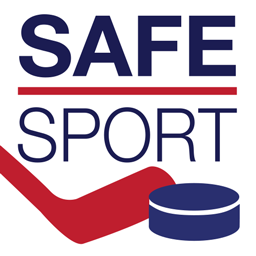
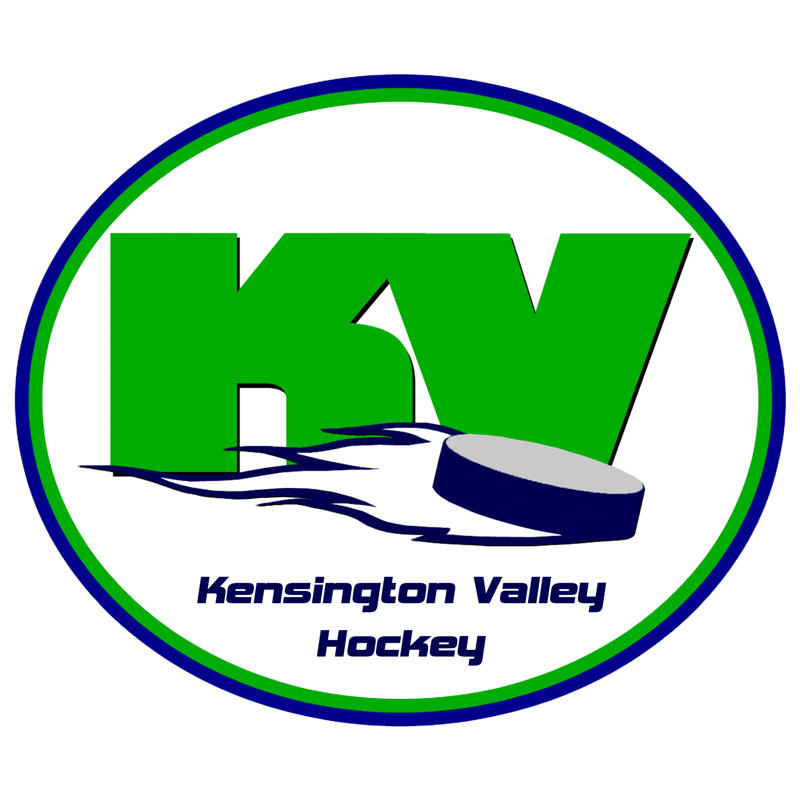
Quick links
Parents, and all adult members of USA Hockey are required, to report violations of the USA Hockey SafeSport Program policies as set forth in the USA Hockey SafeSport Program Handbook.
SAFESPORT TRAINING FOR COACHES, MANAGER AND LOCKER ROOM MONITORS
USA Hockey requires all volunteers complete SafeSport Training at no cost in order to be placed on an official roster to serve on the ice, on the bench, in the locker room or team manager roles.
As of June 2019, USA Hockey updated requirements for Safesport to include players who are 18 years old, or who will be turning 18 during the season. Those players must complete the Safesport training BEFORE they can be rostered.
The Initial Core Center for Safesport Training will take approximately 90 – 120 minutes to complete. The refresher courses are available each subsequent year and take are 30 minutes or less to complete
KVHA Team Travel Policy
KVHA has teams that travel locally, regionally, nationally, or internationally to play individual games, two or three games at a time, or in tournaments. Some teams are limited to only a few events per year, and some teams have no travel other than local travel to and from our own arena. KVHA has established travel policies to guide our teams, to minimize one-on-one interactions and reduce the risk of abuse or misconduct. Adherence to these travel guidelines will increase player safety and improve the player’s experience while keeping travel a fun and enjoyable experience.
Players and/or their parents/guardians are responsible for making all arrangements for travel to and from team events, including tournaments. It is the responsibility of the parents/guardians to ensure the person transporting the minor player maintains the proper safety and legal requirements, including, but not limited to, a valid driver’s license, automobile liability insurance, a vehicle in safe working order, and compliance with applicable state laws.
The employees, coaches, and/or volunteers of KVHA or one of its teams, who are not also acting as a parent, should not drive alone with an unrelated minor player and should only always drive with at least two players or another adult.
Employees, coaches, and volunteers who are also a player’s parent or guardian may provide shared transportation for any player(s) if they pick up their player first and drop off their player last in any shared or carpool travel arrangement.
Regardless of gender, a coach shall not share a hotel room or other sleeping arrangement with a minor player (unless the coach is the parent, guardian, or sibling of the player).
If disciplinary action against a player is required while the player is traveling without his/her parents, then except where immediate action is necessary, parents will be notified before any action is taken or immediately after the action.
No coach, manager, or chaperone shall at any time be under the influence of alcohol or drugs while performing their coaching and/or team duties.
Private and Adult Interactions
There should be no private, one on one interactions between a coach or manager and a minor participant at any time or in any setting. Any meetings with a minor participant and a coach or manager shall require an additional responsible adult, or parent, in attendance.
To best protect athletes from abuse or misconduct in our sport, it is critical that parents of minor athletes are familiar with the policies of USA Hockey and monitor to help ensure that interactions between their children and adults follow the rules and regulations. USA Hockey strongly encourages parents to watch the training and make their children aware of the USA Hockey SafeSport Program policies concerning interactions between adults and minors. Parents should not permit their children to participate in interactions that are not in compliance with USA Hockey SafeSport policies.
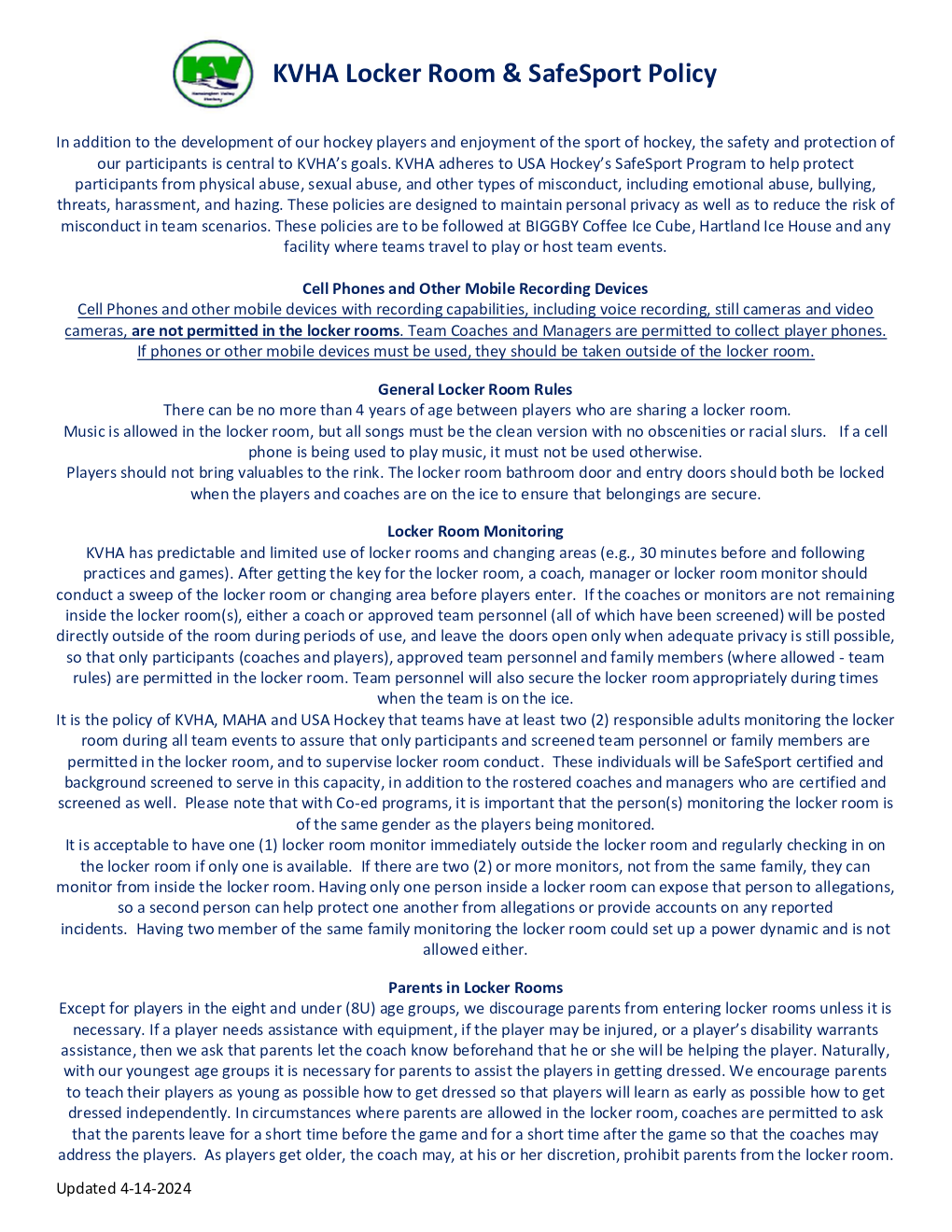
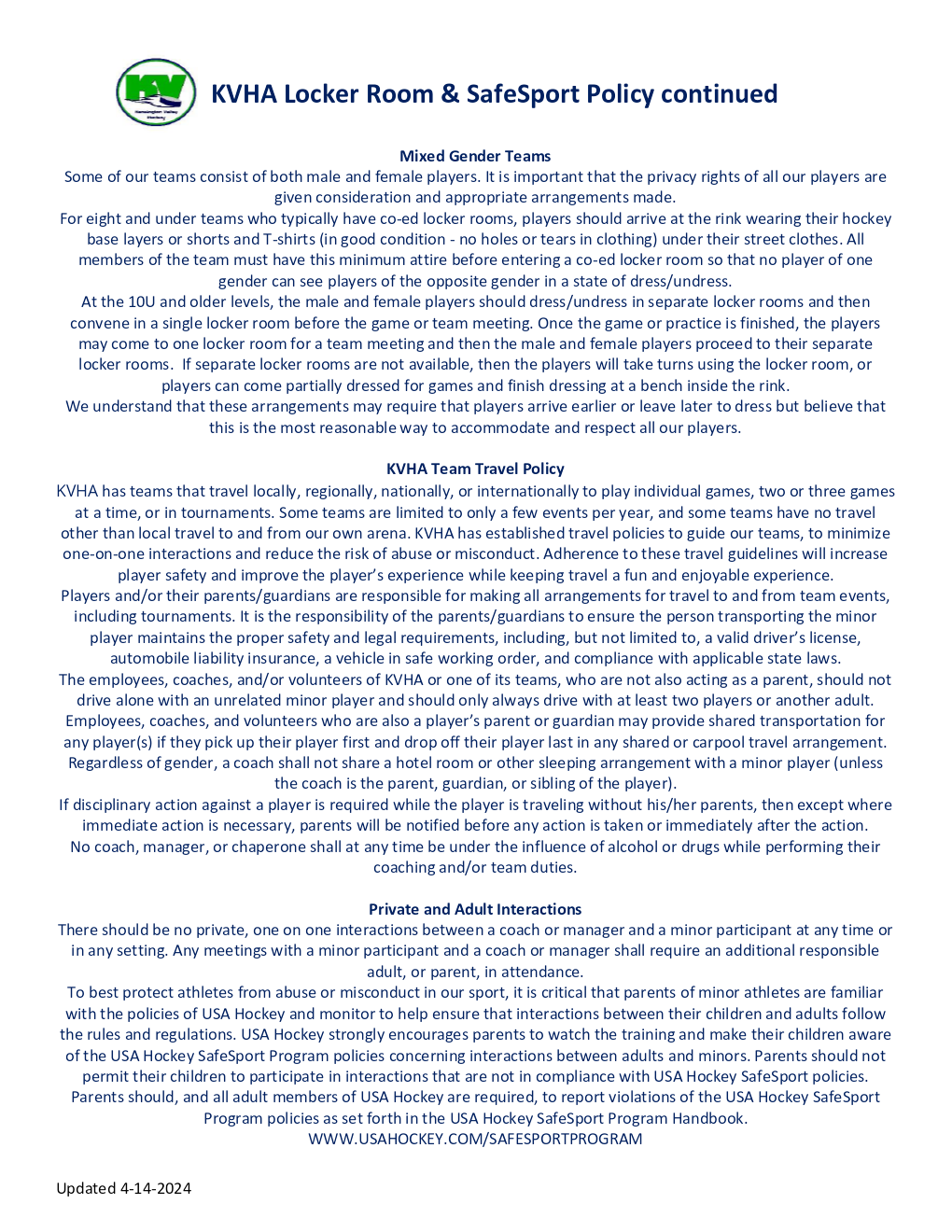
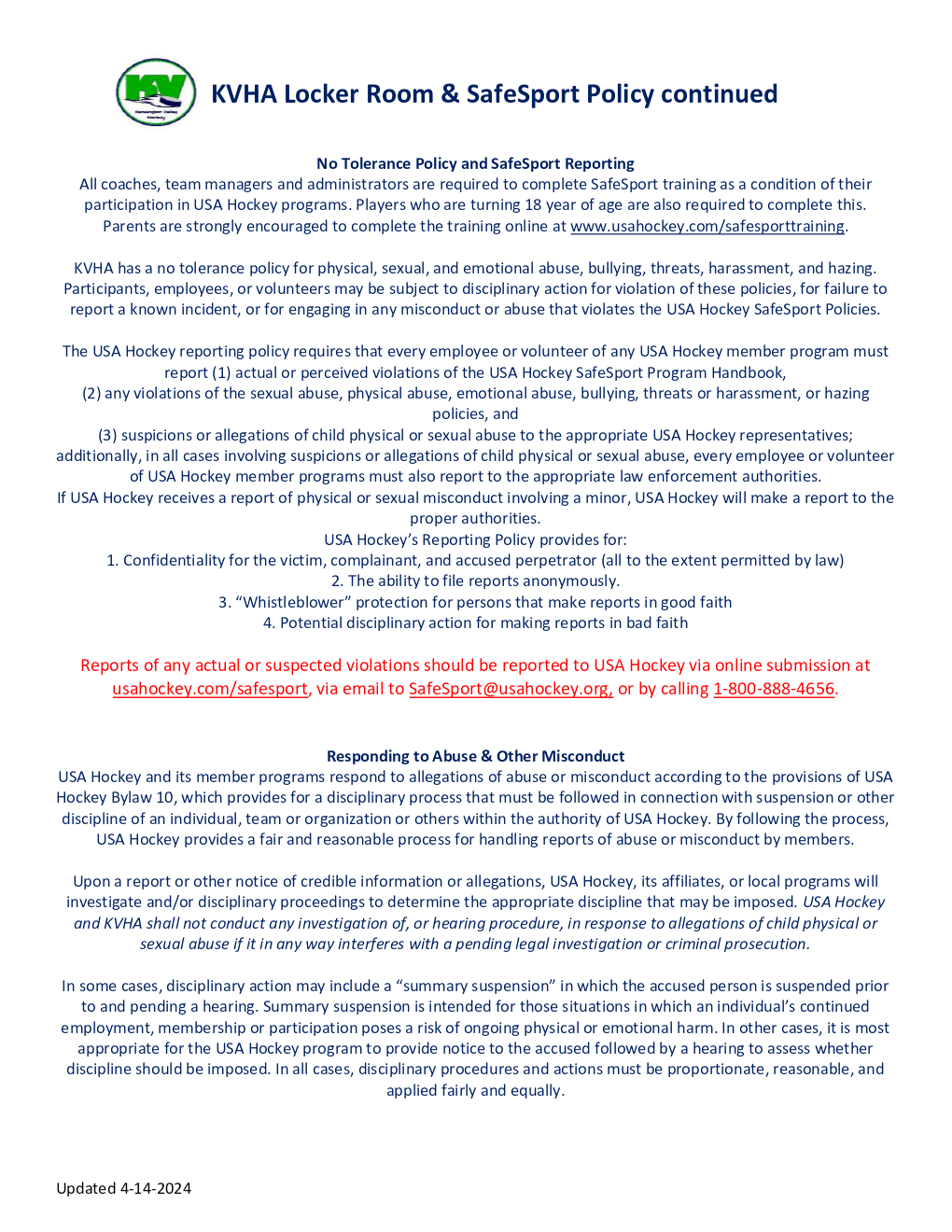
From the MAHA Annual Guide pages 56-59
XIII: Safe Sport / Abuse Prevention
1. The Abuse Prevention Committee shall include the MAHA legal counsel. The committee shall promulgate the rules, procedures, and programs for the screening of personnel, receive allegations of physical and sexual abuse as defined below and suspend individuals after diligent investigations.
2. MAHA Screening Policy.
It is the policy of the MAHA that it will not allow participation in its programs any volunteer or employee who has routine access to children (anyone under the age of majority) who refuses to consent to be screened by the MAHA before he/she is allowed to have routine access to children in the MAHA’s programs. This policy includes coaches, referees, MAHA personnel, Association personnel, League personnel; any age of majority participant that comes in contact with minors within MAHA’s programs and those persons who billet on a
continuing basis. A person may be disqualified and prohibited from serving as a volunteer or employee of the MAHA if the person has:
a. Been convicted (including crimes the record of which have been expunged and pleas of “no contest”) of a crime of child abuse, sexual abuse of a minor, physical abuse, causing a child’s death, neglect of a child, murder, manslaughter, felony assault, any assault against a minor, kidnapping, arson, criminal sexual conduct, prostitution related crimes,
controlled substance crimes or misappropriation of funds.
i. For purposes of this policy, controlled substances shall include “mood altering substances” as shown below:
(1) Intoxicating beverages, including, but not limited to, alcohol.
(2) Non-prescription or prescribed controlled substances.
(3) Prescription or prescribed controlled substances when used to an excess in violation of doctor’s orders, or to produce the state of intoxication in the participant.
b. Been adjudged liable for civil penalties or damages involving sexual or physical abuse of children.
c. Been subject to any court order involving any sexual abuse or physical abuse of a minor, including but not limited to domestic order for protection.
d. Had their parental rights terminated.
e. A history with another organization (volunteer, employment, etc.) of complaints of sexualor physical abuse of minors.
f. Resigned, been terminated, or been asked to resign from a position, whether paid orunpaid, due to complaint(s) of sexual or physical abuse of minors; or
g. Has a history of other behavior that indicates they may be a danger to children in the MAHA.
3. It is recognized that some youth players do leave home to play hockey in a location away from their parents. In those circumstances, the organization or team typically arranges for the player to live with a host or billet family. Having youth players live outside their homes
increases risk for abuse and misconduct to occur. It shall be the obligation of each team/association that arrange for players to live with billet families to have written policies and procedures in place to govern the arrangement. The team/organization must assign a
billeting coordinator for each team that is billeting players. All non-Michigan billeted players must register with USA Hockey using their parent’s home address. The billeting coordinator
will be familiar and follow all rules set forth in the USA Hockey Billeting Policy located in the Safe Sport Handbook. The billeting coordinator for each team will report directly to the District Director in direct charge of his team. No billeted player can be placed on a roster without the District director’s approval. The District Director will provide a list of Billeted players to the MAHA Youth Vice President. Billeting rules are in effect for Regular, Pre/Post and Spring Summer teams.
4. Definitions.
a. Sexual Abuse.
Sexual abuse is when the perpetrator touches a child for the sexual arousal or gratification of either the perpetrator or the child or when a child touches the perpetrator at the perpetrator’s request or with his/her consent such as but not limited to touching a child’s
intimate body parts, touching the clothing over a child’s intimate body parts, fondling, oral, genital or anal penetration (including kissing), intercourse, rape, having a child touch the perpetrator’s intimate body parts. B) Any charge brought by governmental authority
for solicitation on the internet, or other electronic or telephone devices, of a minor(s) for purposes of sex (an illegal or immoral act).
b. Physical Abuse.
Physical abuse is physical contact with a participant that intentionally causes the participant to sustain bodily harm or personal injury or having physical contact with a participant that intentionally creates a threat of immediate bodily harm or personal injury, including but not limited to hitting, swatting, twisting limbs, kicking, striking with
an object, biting, poking, pushing, or shoving or forcing the victim into a barrier.
5. Any of the following named persons / positions who shall become engaged with the MAHA after August 1st shall immediately submit to a background screening. Participation in the MAHA is prohibited unless he/she has submitted the application.
a. Each coach, assistant coach, manager, referee, instructor, minor official, officers of all Associations and any volunteer or employee who has routine access to children (everyone under the age of majority) shall complete the online background screening application
authorizing the Abuse Prevention Committee to obtain criminal history records from any governmental unit.
b. For coaches and managers, the background screening confirmation form shall be delivered to the USA Hockey Associate Registrar at the time the volunteer submits the team roster for certification. For all other Association/Club personnel, the background screening confirmation form shall be submitted to the Association/Club president. Referees are to submit their background screening confirmation form to their District Referee Supervisor.
6. If upon review of the criminal record of an individual by the committee designee, there appears any of the crimes set forth in the abuse prevention policy, or misdemeanor convictions having a sexual nature, the designee shall forward the criminal record to the
Chairman of the committee. The Chairman shall forthwith notify the participant in writing, by certified mail, that he/she is disqualified and to immediately cease MAHA participation. The Chairman shall advise the participant that he/she shall have five (5) days in which to request
in writing a hearing to discuss the disqualification. Upon receipt of a request for hearing, the Chairman shall appoint three members of the committee to discuss the circumstances of the criminal record with the participant. The three-member committee shall notify the Chairman
of the results of the hearing. The Chairman shall notify the participant. Only the Chairman and the three-member panel shall be made aware of the name of the participant. If the disqualification is sustained, the participant is disqualified from all MAHA/USA Hockey participation of every nature.
7. All allegations of sexual abuse shall be in writing and sealed and forwarded to the Chairman. There shall be no disclosure to any other person except the Chairman and his designees. The allegations shall be immediately forwarded to the applicable police department or other
appropriate governmental authority and to the MAHA legal counsel. The chairman, upon receipt of the allegations, shall notify the accused in writing that he/she is immediately disqualified from all MAHA/USA Hockey participation of every nature. The Chairman shall report the incident to the US Center for Safe Sport.
8. Allegations of physical abuse shall be reported in writing to the Chairman of the committee. The participant shall not be suspended from MAHA activities. The Vice President of Abuse shall appoint an investigator who shall determine the circumstances of the allegations. The Chairman shall report the allegations to the appropriate governmental agency. Upon report of the investigator, the Chairman shall appoint a three-member panel from members of the committee who shall forthwith, after notice to all interested parties, hear the evidence and determine if the participant shall be suspended from MAHA participation. If the investigator determines that there are not sufficient grounds, he shall notify the Chairman, who shall notify the volunteer.
9. The proceedings shall be conducted with utmost confidentiality for the protection of the accused participant and the alleged victim. If allegations of abuse prove to be entirely unfounded or were submitted for any other reason than the prevention of abuse, the party submitting the allegations shall be suspended from MAHA activities.
10. It is the policy of the MAHA and USA Hockey that there shall be no hazing of any participant involved in any of their sanctioned programs, training camps, hockey clinics, coaches clinics, referee clinics, District, State and National tournaments or other MAHA / USA Hockey events
by any employee, volunteer, participant or independent contractor.
Hazing Definition: Conduct which is insulting, intimidating, humiliating, offensive, or physically harmful. Any player, team official, executive member of a Team, Club or Association having been party to or having had knowledge of any degrading hazing, or initiation rite without reporting or taking action on it shall be subject to suspension from
playing or holding office with any Team, Club, Association, or the MAHA.
